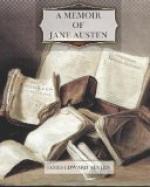which prevailed in her family. She was well acquainted
with the old periodicals from the ‘Spectator’
downwards. Her knowledge of Richardson’s
works was such as no one is likely again to acquire,
now that the multitude and the merits of our light
literature have called off the attention of readers
from that great master. Every circumstance narrated
in Sir Charles Grandison, all that was ever said or
done in the cedar parlour, was familiar to her; and
the wedding days of Lady L. and Lady G. were as well
remembered as if they had been living friends.
Amongst her favourite writers, Johnson in prose, Crabbe
in verse, and Cowper in both, stood high. It
is well that the native good taste of herself and
of those with whom she lived, saved her from the snare
into which a sister novelist had fallen, of imitating
the grandiloquent style of Johnson. She thoroughly
enjoyed Crabbe; perhaps on account of a certain resemblance
to herself in minute and highly finished detail; and
would sometimes say, in jest, that, if she ever married
at all, she could fancy being Mrs. Crabbe; looking
on the author quite as an abstract idea, and ignorant
and regardless what manner of man he might be.
Scott’s poetry gave her great pleasure; she
did not live to make much acquaintance with his novels.
Only three of them were published before her death;
but it will be seen by the following extract from one
of her letters, that she was quite prepared to admit
the merits of ‘Waverley’; and it is remarkable
that, living, as she did, far apart from the gossip
of the literary world, she should even then have spoken
so confidently of his being the author of it:—
’Walter Scott has no business to write novels; especially good ones. It is not fair. He has fame and profit enough as a poet, and ought not to be taking the bread out of other people’s mouths. I do not mean to like “Waverley,” if I can help it, but I fear I must. I am quite determined, however, not to be pleased with Mrs. —–’s, should I ever meet with it, which I hope I may not. I think I can be stout against anything written by her. I have made up my mind to like no novels really, but Miss Edgeworth’s, E.’s, and my own.’
It was not, however, what she knew, but what she was, that distinguished her from others. I cannot better describe the fascination which she exercised over children than by quoting the words of two of her nieces. One says:—
’As a very little girl I was always creeping up to aunt Jane, and following her whenever I could, in the house and out of it. I might not have remembered this but for the recollection of my mother’s telling me privately, that I must not be troublesome to my aunt. Her first charm to children was great sweetness of manner. She seemed to love you, and you loved her in return. This, as well as I can now recollect, was what I felt in my early days, before I was old enough to be amused by her cleverness. But soon came the




